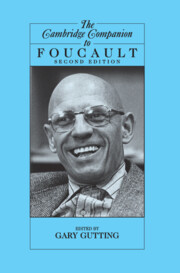Book contents
- Frontmatter
- Introduction Michel Foucault: A User’s Manual
- 1 Foucault’s Mapping of History
- 2 Foucault and the History of Madness
- 3 The Death of Man, or Exhaustion of the Cogito?
- 4 Power/Knowledge
- 5 Ethics as Ascetics: Foucault, the History of Ethics, and Ancient Thought
- 6 Michel Foucault’s Ethical Imagination
- 7 The Analytic of Finitude and the History of Subjectivity
- 8 Foucault’s Encounter with Heidegger and Nietzsche
- 9 Foucault and Habermas
- 10 Foucault’s Relation to Phenomenology
- 11 Against Interiority: Foucault’s Struggle with Psychoanalysis
- 12 Foucault’s Modernism
- 13 Queering Foucault and the Subject of Feminism
- Bibliography
- Addendum to Bibliography, 1993–2005
- Index
11 - Against Interiority: Foucault’s Struggle with Psychoanalysis
Published online by Cambridge University Press: 28 August 2006
- Frontmatter
- Introduction Michel Foucault: A User’s Manual
- 1 Foucault’s Mapping of History
- 2 Foucault and the History of Madness
- 3 The Death of Man, or Exhaustion of the Cogito?
- 4 Power/Knowledge
- 5 Ethics as Ascetics: Foucault, the History of Ethics, and Ancient Thought
- 6 Michel Foucault’s Ethical Imagination
- 7 The Analytic of Finitude and the History of Subjectivity
- 8 Foucault’s Encounter with Heidegger and Nietzsche
- 9 Foucault and Habermas
- 10 Foucault’s Relation to Phenomenology
- 11 Against Interiority: Foucault’s Struggle with Psychoanalysis
- 12 Foucault’s Modernism
- 13 Queering Foucault and the Subject of Feminism
- Bibliography
- Addendum to Bibliography, 1993–2005
- Index
Summary
I had been mad enough to study reason.
I was reasonable enough to study madness.
Michel Foucault, Technologies of the SelfUnreason becomes the reason of reason.
Michel Foucault, Histoire de la folieAnd how comfortless is the thought that the sickness of the normal does not necessarily imply as its opposite the health of the sick.
Theodor Adorno, Minima MoraliaIn The History of Sexuality, Volume I, Foucault claimed to have definitively refuted the basic claims of psychoanalysis. However, a year after its publication, when a young acquaintance asked him to recommend a form of therapy, Foucault gave rather unexpected advice. Instead of suggesting something avant garde, like Deleuze and Guattari's schizoanalysis, he replied, “Freudian will be fine.” This incident - as well as a consideration of his oeuvre - indicates the intensely conflicted and complex nature of Foucault's relation to analysis. Just as Moses haunted Freud “like an unlaid ghost,” so Foucault could never successfully exorcise the specter of Freud. He kept returning to Freud throughout his career. Indeed, the persistence of Foucault's comings and goings with respect to the Freud led Derrida to remark sardonically that he was engaged in an “interminable and inexhaustible” fort-da game with the founder of psychoanalysis.
- Type
- Chapter
- Information
- The Cambridge Companion to Foucault , pp. 312 - 347Publisher: Cambridge University PressPrint publication year: 2005
- 8
- Cited by

